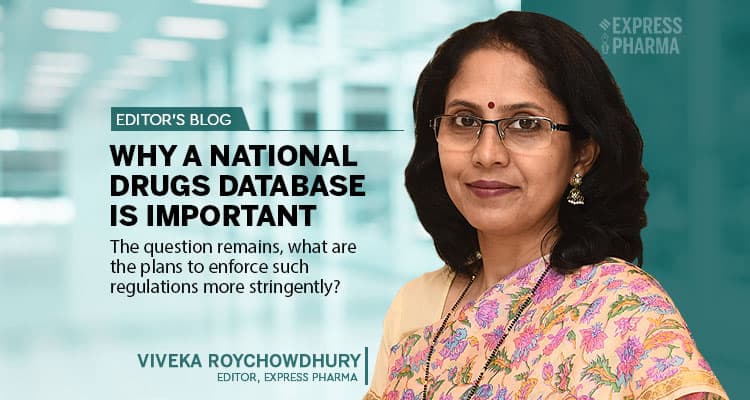Why a National Drugs Database is important
The question remains, what are the plans to enforce such regulations more stringently?
Authorities from The Gambia’s Medicines Control Agency have now seemingly back-tracked on their initial allegations linking Haryana-based Maiden Pharma’s cough syrup to the deaths of 70 children from acute kidney injury.
A Reuters report dated November 2 quotes Tijan Jallow of The Gambia’s Medicines Control Agency, saying, “We haven’t concluded yet it is the medicine that caused it. A good number of kids died without taking any medications.” There are reports of children in Indonesia dying from similar kidney injuries, linked to the use of paracetamol syrups.
While we wait for more clarity and the final reports of the investigation, an office memorandum dated October 27 from the Drug Controller General of India, VG Somani, announced the setting up of a seven-member panel to prepare India’s ‘National Drugs Database.’
Explaining the rationale for such a move, Somani said that such a database is “crucial” for “not only empowering consumers but also improving the monitoring mechanism for quality of drugs in circulation across the country and uniform administration of the regulatory system.”
Over the next three months, the seven-member committee will “examine the existing database available with various authorities like States/UT Drug Control Department, various manufacturers, marketers, importers.”
The Committee is expected to give its recommendations and prepare a comprehensive National Drugs Database for drug formulations manufactured/ marketed in the country. It will provide detailed information on the drug, its dosage form, strength, and details of the manufacturer, marketer or importer of the drug, as per the office memo.
AK Pradhan, Joint Drugs Controller of India, will be the convener of the panel. Other members of the panel include Dr Hemant Koshia, Commissioner, Food and Drug Control Administration (FDCA), Gujarat; Dr Pooja Gupta from AIIMS, New Delhi; Dr Jerian Jose, scientist at the Indian Council of Medical Research, New Delhi, DR Gahane, Joint Commissioner of Food and Drug Administration (FDA), Maharashtra; BT Khanapure, State Drugs Controller, Karnataka, and Navneet Marwaha, State Drugs Controller, Himachal Pradesh.
Dr Koshia reveals that some states with major pharma hubs, like Gujarat and Maharashtra, have already developed their own databases independent of each other and the centre. Now, the task is to decide on the best template and merge these databases seamlessly.
Gujarat, for instance, uses an online drug licenses database, developed with NIC, since 2012-13. With information on all drug manufacturing licenses literally at his fingertips, Dr Koshia recounted how the database gave him an almost instant idea of the stocks of Hydroxychloroquine (HCQ), with both API and formulation makers, during the pandemic. He had a list of manufacturers from his state within minutes and was able to contact them within an hour, requesting them to stop exports till the country’s needs were met. He was ready with names of manufacturers within his state and their inventory levels when the authorities called him to give an idea of HCQ stocks within the state.
The plan, according to Dr Koshia, is first to catch the low-hanging fruit, i.e. link up the major pharma-producing states, like Gujarat, Maharashtra, Andhra Pradesh, Goa, Himachal Pradesh, Uttarakhand, etc as fast as possible to a national drugs database, co-developed by NIC and CDAC, which would cover almost 80-90 per cent of the country’s drug production. The other states will be added in due course of time, after adequate training on the software, etc.
Forming a national drugs database is a very welcome announcement, and it is impossible not to view it as learning from The Gambia-Maiden Pharma case. One wonders why it wasn’t attempted earlier, or if earlier attempts were not successful. However, better late than never.
Irrespective of whether the children in The Gambia and Indonesia died after consuming Maiden Pharma’s products or not, it is important to trace out the probable reasons for these tragic deaths. If any of the products have higher than acceptable levels of diethylene glycol (DEG) and ethylene glycol, then this needs to be rectified.
The children in The Gambia could have died of ‘underlying causes’ or pre-existing health conditions. As the country’s most recent official statement mentions, it’s now coming to light that many children who died reportedly did not consume Maiden Pharma’s syrup, while others went on to survive despite consuming the product.
With the growing realisation among global regulators that the presence of novel nitrosamines is more widely spread than previous estimates, regulators will have to reconfirm what daily levels of DEG are acceptable. This is an evolving problem and it could take time to understand all the technical aspects.
Regulators can only remind the industry of existing guidelines designed to detect such impurities. For example, an October 7 letter from Dr Rajiv Singh Raghuvanshi, Secretary-cum-Scientific Director, IPC, to the DCGI pointed out that the commission has developed 1000 Indian Pharmacopoeia Reference Standards (IPRS) and impurity standards for the quality testing of drugs. Somani urged pharma manufacturers to use the IPRS to ensure their manufacturing facilities maintained the quality of drugs.
The question remains, what are the plans to enforce such regulations more stringently? It is 36 years since glycerine contaminated with DEG was linked to 16 deaths in Mumbai’s JJ Hospital. The case continues, with the accused yet to be brought to book. The case was the first time DEG was linked to deaths and for a while, impurity testing took centre stage.
Clearly, we let down our guard too soon. Today, even more is at stake. Hopefully, initiatives like the National Drugs Database incorporate the lessons learnt. Equally, if not, more importantly, manufacturers need to man up and stop cutting corners hoping that the law will never catch up.
viveka.r@expressindia.com
viveka.roy3@gmail.com


